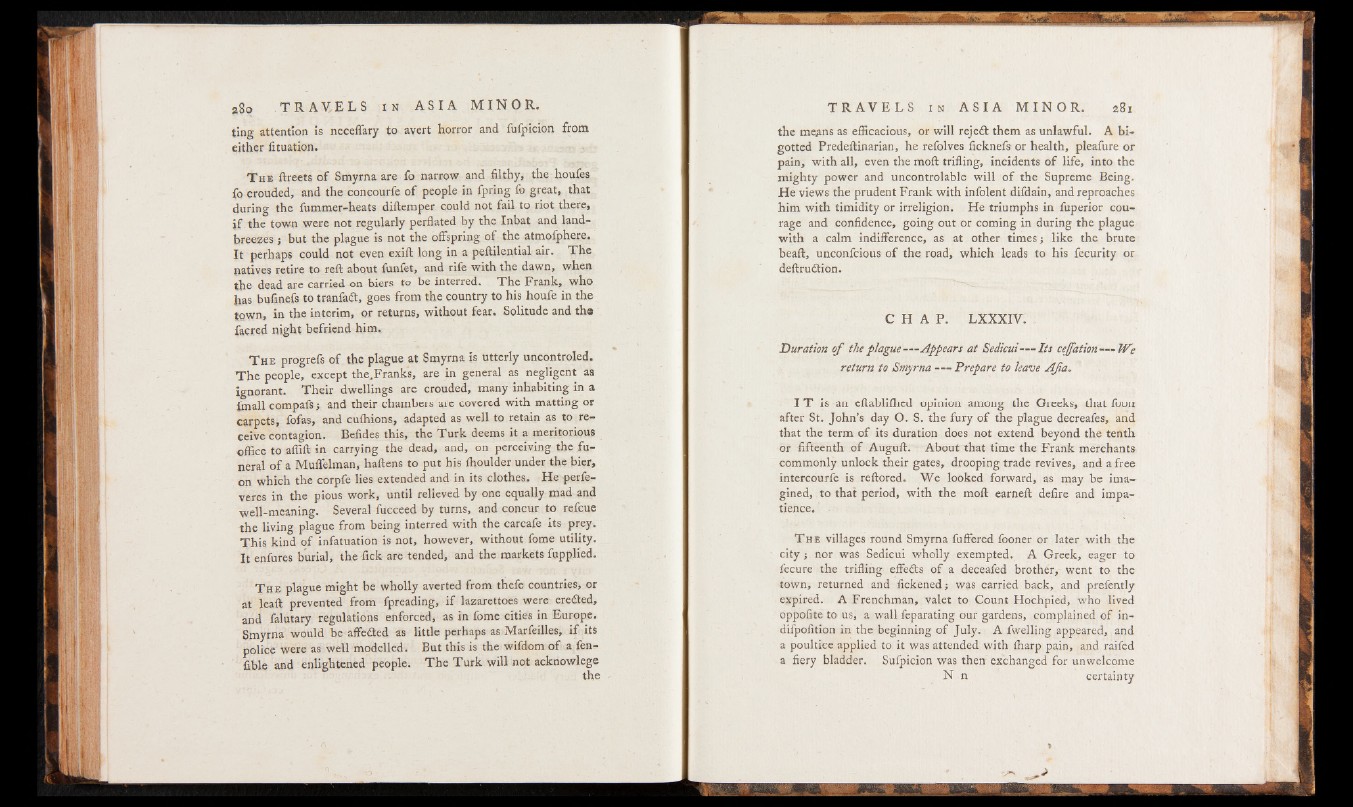
ting attention is neceffary to avert horror and fufpicion from
either fituation.
T he ftreets of Smyrna are fo narrow and filthy, the houfes
fo crouded, and the concourfe of people in fpring fo great, that
during the fummer-heats diftemper could not fail to riot there,
i f the town were not regularly perflated by the Inbat and land-
breezes 5 but the plague is not the offspring of the atmofphere.
It perhaps could not even exift long in a peftilential air. The
natives retire to reft about funfet, and rife with the dawn, when
the dead are carried on biers to be interred. The Frank, who
has bufinefs to tranfadt, goes from the country to his houfe in the
town, in the interim, or returns, without fear. Solitude and tha
facred night befriend him.
T he progrefs of the plague at Smyrna is utterly uncontroled.
The people, except the.Franks, are in general as negligent as
ignorant. Their dwellings are crouded, many inhabiting in a
ftnall compafsj and their chambers are covered with matting or
carpets, fofas, and cufhions, adapted as well to retain as to receive
contagion. Befides this, the Turk deems it a meritorious
office to affift in carrying the dead, and, on perceiving the funeral
of a Muffelman, haftens to put his ffioulder under the bier,
on which the corpfe lies extended and in its clothes. He perfe-
veres in the pious work, until relieved by one equally mad and
well-meaning. Several fucceed by turns, and concur to refcue
the living plague from being interred with the carcafe its prey.
This kind of infatuation is not, however, without fome utility.
It enfures burial, the dick are tended, and the markets fupplied.
T he plague might be wholly averted from thefe countries, or
at leaft prevented from fpreading, if lazarettoes were eredted,
and falutary regulations enforced, as in fome cities in Europe.
Smyrna would be affedted as little perhaps as Marfeilles, if its
police were as well modelled. But this is the wifdom of a den-
fible and enlightened people. The Turk will not acknowlege
281
the means as efficacious, or will rejedt them as unlawful. A bi-
gotted Predeftinarian, he refolves ficknefs or health, pleafure or
pain, with all, even the moft trifling, incidents of life, into the
mighty power and uncontrolable will of the Supreme Being.
He views the prudent Frank with infolent difdain, and reproaches
him with timidity or irreligion. He triumphs in fuperior courage
and confidence, going out or coming in during the plague
with a calm indifference, as at other times; like the brute
beaft, unconfcious of the road, which leads to his fecurity or
deftrudtion.
C H A P . LXXXIV.
Duration o f the plague— Appears at Sedicui— Its ceffation— We
return to Smyrna -— Prepare to leave A fa .
I T is an eftablifhed opinion among the Greeks, that foon
after St. John’s day O. S. the fury of the plague decreafes, and
that the term of its duration does not extend beyond the tenth
or fifteenth of Auguft. About that time the Frank merchants
commonly unlock their gates, drooping trade revives, and a free
intercourfe is reftored. We looked forward, as may be imagined,
to that period, with the moft earned: defire and impatience.
T he villages round Smyrna differed dooner or later with the
city j nor was Sedicui wholly exempted. A Greek, eager to
fecure the trifling effects of a deceafed brother, went to the
town, returned and fickened; was carried back, and prefently
expired. A Frenchman, valet to Count Hochpied, who lived
oppofite to us, a wall feparating our gardens, complained of in-
difpofition in the beginning of July. A dwelling appeared, and
a poultice applied to it was attended with ffiarp pain, and raided
a fiery bladder. Sudpicion was then exchanged for unwelcome
N n certainty